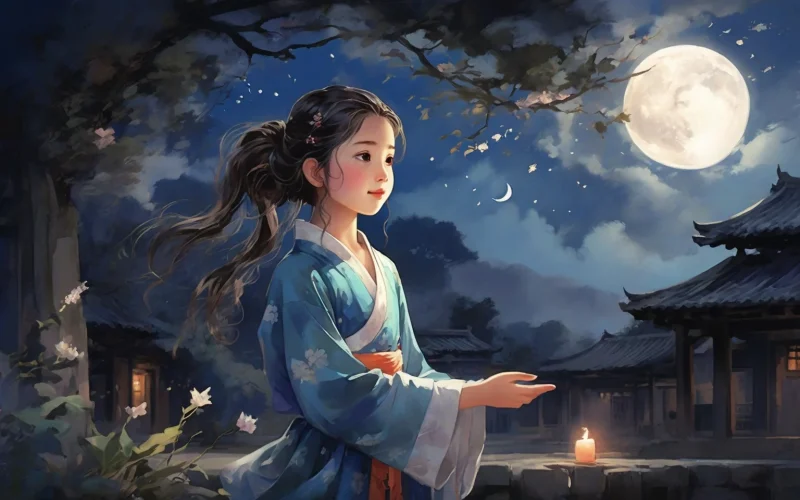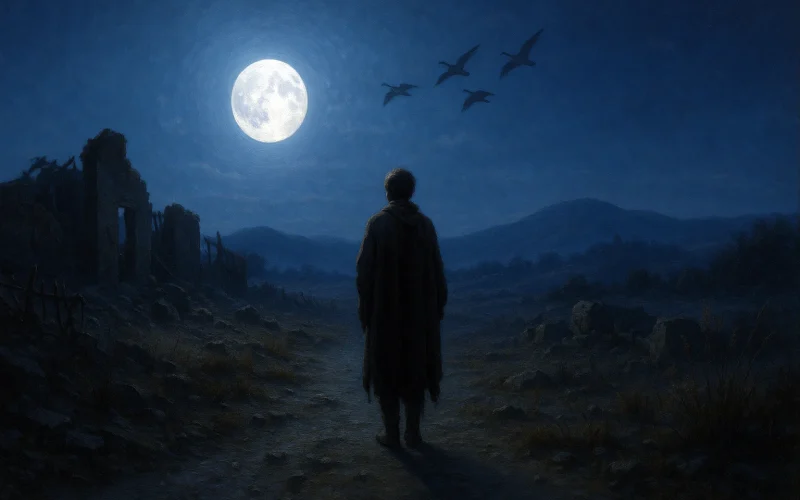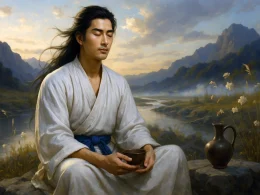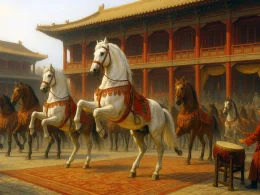My youngest daughter's six years old;
She cannot tell clumsy from clever.
At night on crossing the threshold,
She prays the moon to shine forever.
Original Poem
「幼女词」
施肩吾
幼女才六岁,未知巧与拙。
向夜在堂前,学人拜新月。
Interpretation
This charming short poem captures a tender moment of the poet's six-year-old daughter. Shi Jianwu, known for his affectionate family poems, here immortalizes a child's innocent imitation of adult rituals, offering us a precious glimpse into Tang domestic life and the universal charm of childhood.
First Couplet: "幼女才六岁,未知巧与拙。"
Yòu nǚ cái liù suì, wèi zhī qiǎo yǔ zhuō.
My little girl's but six years old, Too young to know what's wise or fooled.
The poet emphasizes her tender age ("but six years") and complete innocence ("too young to know"), establishing the poem's tone of affectionate observation. The parallel concepts of wisdom and foolishness remain beautifully meaningless in her unselfconscious world.
Second Couplet: "向夜在堂前,学人拜新月。"
Xiàng yè zài táng qián, xué rén bài xīn yuè.
At dusk before our hall she stands, Copying moon-worship with small hands.
This vivid snapshot reveals the child's earnest mimicry of the lunar worship ritual. Her solemn imitation, both comical and touching, perfectly captures how children blend play with unconscious learning. The "small hands" detail underscores the delightful incongruity between childish innocence and formal adult ceremony.
Holistic Appreciation
Centering on the domestic scene of "worshipping the new moon," the poem portrays a little girl's clumsy imitation of adult rituals, conveying profound paternal affection through meticulous observation. The opening lines establish her innocence through age-specific awareness, while subsequent details of her adorable behavior flow into natural whimsy. Rather than explicit sentimentality, the poet evokes universal resonance through lived details, achieving refreshing subtlety—both playful and deeply suggestive. Though brief, the work lingers in memory, revealing the gentle warmth of traditional family life.
Artistic Merits
This poem features a concise structure and distilled brushwork, achieving remarkable depth within just twenty-eight characters. Through subtle yet vivid details, the poet masterfully captures a young girl's naive innocence with economical precision. Employing straightforward description and unadorned language, the verses radiate childlike charm. The phrase "imitating adults worshipping the new moon" proves particularly delightful—the earnestness of her mimicry contrasting humorously with her tender age, creating both lifelike authenticity and artistic tension.
Insights
The poem's artless childish gestures rekindle nostalgia for youthful innocence, reminding us to cherish life's small yet moving moments—discovering genuine emotion in the ordinary and warmth in purity. Its exquisite rendering of kinship transforms this miniature verse into an enduring portrait of familial love, resonating across time as both intimate snapshot and emotional archetype.
Poem translator
Xu Yuanchong (许渊冲)
About the Poet
Shi Jianwu (施肩吾), 780-861 AD, was a poet and Taoist scholar of the Tang Dynasty. He was a native of Tongxian Village (later known as Xiande Village) in Fen Shui County, Muzhou. In 820 AD, he passed the imperial examination and became the first Zhuangyuan (top scholar) from the Hangzhou region.












